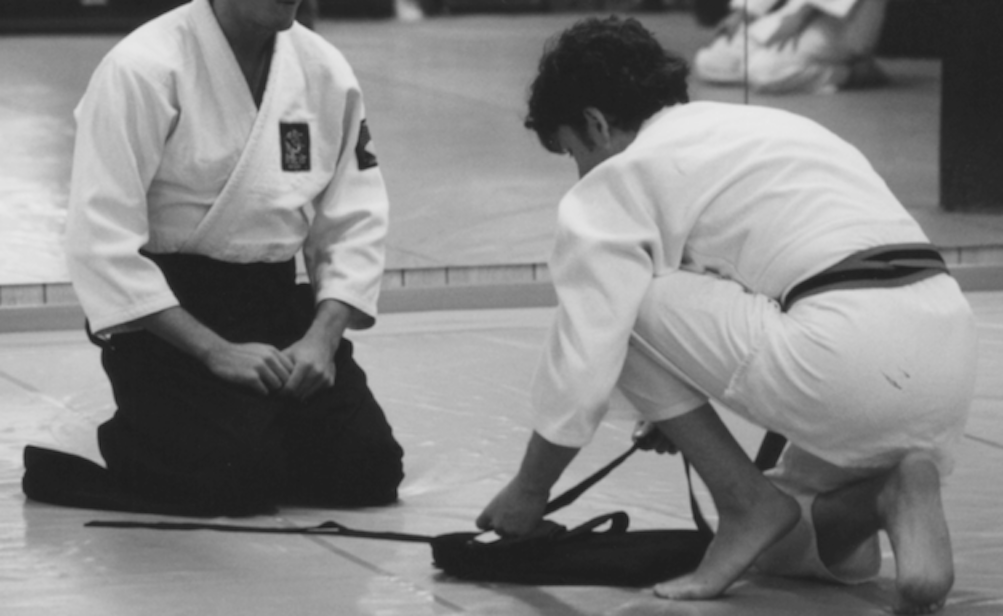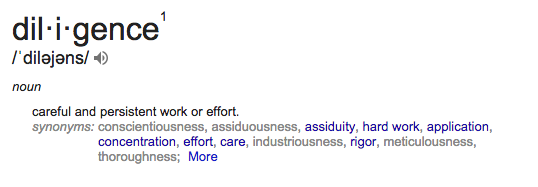Some people, when stuck in a unchanging pattern, look for ways to improve themselves, their routine, or work product. They take a class, or read a book, or look at motivational memes. The motivation works — for a couple days. But eventually it wears off and they’re back to their old routine. That’s because motivation is temporary, but discipline is consistent.
The leading rule for the lawyer, as for the man of every other calling, is diligence. – President Abraham Lincoln
Being a professional of any sort, like many jobs, makes you a slave to the routine. You go into the office again and again. Make phone calls, reply to emails, draft memos. It’s to get stuck in a rut. Place your mind and behavior on cruise control. But it’s not a very good way to get ahead. It’s not how you progress in your job or grow a business.
Diligence and discipline sound very similar. If I asked you if the two words mean the same thing, you’d probably reply, “yeah, sure.” But discipline and diligence are not the same thing. It is important to understand the difference between the two so you can develop and harness the two for your development.
You need discipline in order to develop diligence.
External Pressure v. Internal Discipline
Discipline comes from a variety of sources. The average person proceeds along in autopilot, allowing outside forces to direct their behavior. They rely on external discipline in order to motivate and maintain their behavior. Come in and do your job so you can get paid. Pay taxes or pay a penalty. Obey the law or go to jail.
These are external factors that you are “trained” to understand as you grow up. Growing up, going to school, watching our parents. You pick up these behaviors and follow them without much (if any) thought. You diligently follow these external factors. They’re necessary for a functioning, modern society.
As society does such a good job at enforcing behaviors, it’s easy for people to allow their self-discipline “muscle” atrophy. It’s replaced by their boss. Or advertisements telling you what to need or desire. Or the constant positive reinforcement cycle of games or social media.
Yet having a strong internal discipline “muscle” is of the utmost importance. There is no other way to push yourself beyond average or set your own course. If you’re just following external disciplines imposed on you over time, you’re allowing other people to direct the course of your life.
You can’t allow this if you really want to get ahead – whatever that means to you. Attract more clients, start a business, become a partner. It’s unlikely you’ll find much success at any of these if you are reliant on outside forces for motivation or discipline. Without internal discipline, you’ll never develop diligence in pursuit of your goal.
You have to be able to develop your own routine.
You have to be able to self-motivate.
Less, Not More
Unfortunately, if you’re unaccustomed to self-discipline, your first thoughts likely go to outside sources for developing it. You’ll think you need to take a course. Read a book. Get an app. You’ll need a productivity system. Attend a “The Power of You” seminar. Listen to a podcast. You’ll feel the need to add something to your life in order to jumpstart your self-discipline and develop diligence.
This is a really bad idea.
Developing internal discipline, adopting self-directed diligence, is not additive. It is not about doing more – it is about doing less.
The ability to focus and pursue a goal or activity with ruthless drive develops by stripping away extraneous distractions and obstacles.
Anything preventing you from pursuing your goal or activity needs to be stripped away.
I wrote a book a couple of years ago, The Marble and The Sculptor. The title is taken from a quote by Alexis Carell:
“Man cannot remake himself without suffering, for he is both the marble and the sculptor.”
It resonated with me so much that I named my book after it. It exemplifies almost every experience in my life that led to new skills or achieving new goals. I had to decide to remove things from my life first, before I could begin to add more to it.
 Get a black belt? Stop going out with friends as much. Go to the dojo on weekends, spend hours training with the other dedicated people. Get a JD? Stop doing anything else and focus on law school (except working a full time job, being married, having a child my 2L year – which still didn’t stop me from doing triathlons while I was in law school. See pic). Write a book? Go to bed early so I can wake up first thing in the morning and write it before I go to work.
Get a black belt? Stop going out with friends as much. Go to the dojo on weekends, spend hours training with the other dedicated people. Get a JD? Stop doing anything else and focus on law school (except working a full time job, being married, having a child my 2L year – which still didn’t stop me from doing triathlons while I was in law school. See pic). Write a book? Go to bed early so I can wake up first thing in the morning and write it before I go to work.
All of these things were “painful.” Hanging out with friends is fun. Having free time is fun. Sleeping in late is fun. Change is unpleasant. Change – remaking oneself – involves suffering.
To shape yourself into into something new, you have to be willing to chip away at your old self. Eliminate old behaviors and routines. You must cultivate the self-discipline to remove unnecessary things from your life so you can develop the diligence necessary to achieve your goals.
So the next goal you set for yourself, don’t start with “what do I need to add to my life to achieve my goal?”
Ask yourself: “What do I need to remove from my life to achieve my goal?”
If you’re a lawyer, LawyerSmack can probably help you with those goals.
















